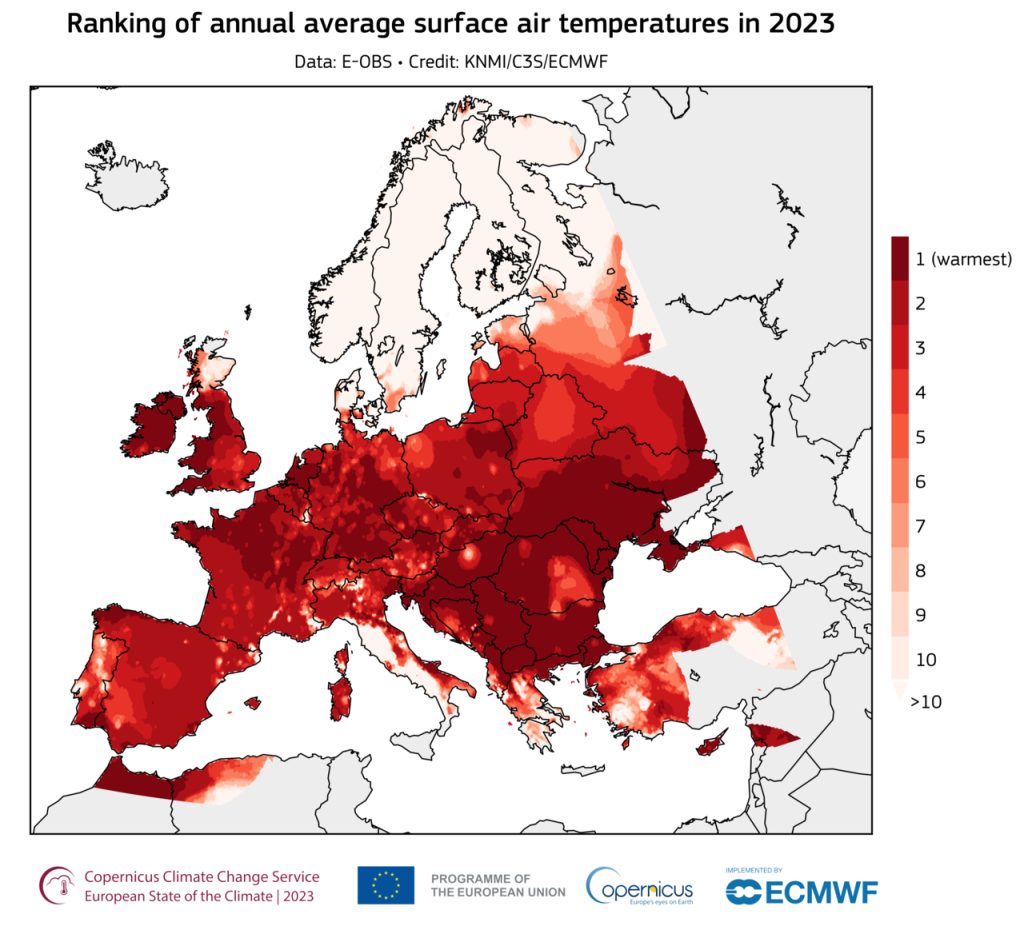The latest report, “European State of the Climate 2023,” compiled by the Copernicus ECMWF, Climate Change Service (C3S) and the World Meteorological Organization (WMO), provides compelling evidence of the warming of Europe’s climate.

Evidence for global warming
One datum should say it all: At 1.0°C above average, and 2.6°C above the pre-industrial level, 2023 was Europe’s warmest year on record, with temperatures above average for the whole year. This is no news as the three warmest years on record for Europe have all occurred since 2020, and the ten warmest since 2007. Global warming evidence for Europe brings extreme events to the table, as 2023 has been a year characterized by large wildfires and droughts, alongside prolonged heat waves and flooding.
Warming temperatures and increasing thermal stress
Temperatures in Europe were astonishing above average for 11 months of the year, with September being the warmest ever recorded. This situation has profound effects on heat stress and drought periods with a record 41% of southern Europe being affected by “strong”, “very strong” or “extreme”heat stress during June 2023, bringing further compelling evidence of the effect of global warming in Europe.
Strong contrast in weather patterns during the 2023 summer
The period from June to September, termed the ‘extended summer’, witnessed a range of extreme weather events across Europe. Northwestern Europe experienced its warmest June on record, while Mediterranean regions received well-above-average rainfall. In July, this pattern was reversed, with southern Europe experiencing warmer-than-average temperatures. Heatwaves affected much of Europe during this period, with both day and night temperatures soaring. By the end of August, southern Europe faced drought conditions due to precipitation deficits, and September emerged as the warmest on record for Europe as a whole, accompanied by severe flood events. The general occurrence of drought conditions in the Mediterranean region coincided with an increased wildfire risk.
The largest wildfire ever recorded in EU
The prolonged drought experienced during the summer, intensified the risk of wildfires in southwestern Europe, notably in the Mediterranean region. This perilous situation culminated in a devastating fire season. Particularly severe fires ravaged the Mediterranean region, including Portugal, Spain, Italy, and Greece, where the largest wildfire ever recorded in the European Union occurred, covering approximately 96,000 hectares (twice the size of Athens) near Alexandroupolis. With a total burnt area of around 500,000 hectares (equivalent to the combined size of London, Paris, and Berlin), the 2023 wildfire season ranked as the fourth largest on record in the EU.

A record year for energy from renewable
In 2023, Europe experienced a remarkable uptake in renewable energy adoption, with renewables accounting for a record 43% of total electricity generation. Climate-driven factors boosted demand, as Southern Europe needed cooling during scorching summers, while Scandinavia faced increased heating demands due to cooler-than-average temperatures. Notably, stormier weather patterns from October to December bolstered wind power potential across the continent. Solar energy potential exhibited regional variations, with above-average levels observed in the mediterranean and Fennoscandia regions, contrasted with below-average potential in northwestern and central regions. Moreover, run-of-river hydropower potential remained high throughout the year, benefiting from increased precipitation and river flow across much of Europe. These trends underscored the dynamic interplay between climate factors and renewable energy prospects in shaping Europe’s energy landscape in the face of global warming.
The role of the ResAlliance project
The ResAlliance is dedicated to enhancing the exchange of knowledge, facilitating skill development, and fostering innovation to ensure landscape resilience. Focusing primarily on Mediterranean nations, ResAlliance collaborates with farmers, foresters, and various stakeholders to address climate change, specifically the effects of wildfires and droughts, by sharing and adopting best practices and governance solutions. Find out more on ResAlliance websites and join the LandNet to take action against climate change now!